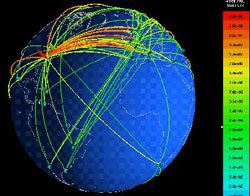“In just a few years, the Internet will disrupt every business. You either prepare to cope – or you perish“. This was proclaimed by The Economist in 1999, just months before Internet stock prices began to plummet and the dot-com bubble burst.
Prepare or Perish
Historically, the Internet has been accompanied by illusions and hype. It has been perceived as a “magical land” of technology that could change the world.
In the early days of the dot-com frenzy, investors poured millions of dollars into new companies at a dizzying pace, hoping they would last more than a few months. The outcome? The vast majority could not do so.
But now we have coexisted with the Internet for several years. The predictions of The Economist and many others have become more logical, even somewhat understated. The web truly is a force that can change the world, and those unprepared for it may indeed perish, as warned.
It may not be as noisy, frenzied, swift, and overwhelming as the early promises, but quietly, steadily, and tirelessly, the Internet is becoming an inseparable part of everyday life, both at home and at work.
The collapse of weak companies during the 2000/2001 period can now be seen as a normal symptom of most revolutions. The important thing to note is that from that “crisis” point, genuinely strong companies continue to grow and dominate the market – and more importantly, our lives.
“Between people, weaving into every locality while still having a global impact, nothing can match the Internet for its colossal influence on our 6 billion humanity“, stated Caleb Chung, co-founder and chief investor of technology company UGOBE.
Encompassing Life
 |
| Source: CyberGeography |
“It has helped me increase my productivity by five times“, philosopher Daniel Dennett admitted.
How many times do you browse the web each day to catch up on current news or read magazines? Do you check your email regularly? Have you ever shopped online?
Consider the powerful online brands like Amazon, Google, or AOL. How has accessing the web from mobile devices or Wi-Fi hotspots in cafes and train stations become so commonplace? All these achievements have occurred within a remarkably short span of years.
The Internet has become so “essential” that no one remembers how they lived and worked before it existed. Nearly every business today uses the web to communicate with customers, manage inventories, or oversee accounts. Financial services – especially in the insurance sector – have flourished online.
Retailers no longer view the web as an enemy or a threat. Telecommunications companies are racing to launch Internet phone services. Even the music, television, and film industries are beginning to embrace paid download formats.
Even print media—the sector hit hardest by the Internet—has started seeking a broader global readership through websites. Podcasts blur the lines between print journalism, television, and radio.
 |
Source: AP |
Blogs are challenging professional journalism and giving rise to a new form of reporting. Readers can easily become “citizen journalists” by sharing their images, video clips, and observations with the public.
The market is transforming, and consumers benefit the most: First and foremost, they have the freedom to choose from a plethora of services and products. Secondly, hunting for “bargains” online is extremely easy—there are countless price comparison websites. Businesses must continuously lower prices and provide better services to compete with one another. Not to mention that shopping online saves us a significant amount of precious time.
“Searching for information online is much quicker and more efficient than going to the library“, said a young man named John Searle. “I can access any research project I am interested in, as long as my brain can process it. I can work anywhere in the world as long as there is an Internet connection.”
Social Connections
The web is not only changing the way we access banking, information, music, films, and all types of products and services; it is also revolutionizing how we communicate with one another. It affects not only our ability to communicate but also our desire to communicate as individuals.
 |
| Source: Solutions |
Virtual social forums like MySpace.com have become the “backbone” of many people’s lives. These are entirely new ideas, never encountered in the real world. “The ability to communicate, share information, and collaborate on projects, etc., has amplified human thinking. The Internet is like a new ‘super intelligent’ nervous system“, said sociologist Peter Diamandis.
However, concerns still persist.
“Watching a child play games or surf the web—in a healthy sense. How can we ensure that these fresh minds absorb everything they need to know and defend themselves against the dark side? We need to provide them with the right tools, teach them how to think critically and aim for clear goals.
In short, we need to equip children with scientific methodology and the ability to embrace technology in a literal sense“, Diamandis analyzed.
Destiny



















































